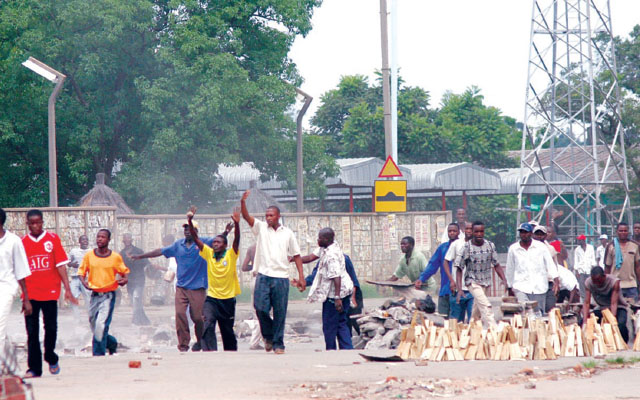‘Opposition politics that propelled MDC now outdated’

Takunda Maodza Assistant News Editor
SCHOLARLY research into next year’s harmonised elections pitting zanu-pf and possibly a coalition of opposition parties continues to point to victory for the ruling party owing to its emancipatory policies and the changing socio-economic landscape which has given birth to new and empowered social classes.
The researchers also argue that politics that propelled the MDC to the summit of opposition politics in 2000 has expired.
In their contributions in the Gravitas Volume 1 Issue 7 released on May 2, 2017, co –editors Tamuka C Chirimambowa and Tinashe L Chimedza in “Thinking Beyond National Reform Agenda (Nera)” argue that the changing social structure “will potentially influence voting patterns”.
“In other-words, we want to reveal the social structural dynamics and argue that for those that are within the pro-democracy movement, they must pay close attention to these emergent classes and their changing accumulation patterns and its likely impacts on voting behaviour and patterns,” argued Messrs Chirimambowa and Chimedza.
They added: “These patterns will likely very much inform how political contestations will play out, simply put, we are saying the analyses that informed the ‘politics of the MDC, NCA and ZCTU in the 1990s are now outdated and relying on them is not only slippery but will drive the pro-democracy movement into a cul-de-sac.”
They noted that the urban areas were now informalised. The “working class” had depleted while “the emergence of the new farmers is changing rural/agrarian class structure”.
“While the first wave of Nera protests drew thousands and built a necessary momentum more and more, the protests are dwindling in numbers and at that rate very soon there will be very negligible numbers.
“The numbers are paltry when compared to the ZCTU, NCA, Zinasu and women’s movement protests which rocked the foundations of the ruling elite in the 1990s and the early 2000s.
“One critical factor which must not be missed is that the 1990s and 2000s boycotts, protests and stays-away were effective because they were built on the bedrock of working political power and the demands were ‘bread and butter’ issues.”
Messrs Chirimambowa and Chimedza further posited that such an agenda was concretely related to everyday material questions, which easily galvanised support for the nascent pro-democracy movement.
“A vendor at Sakubva Bus Terminus in Mutare, a tuck shop owner in Makokoba in Bulawayo, a cross border trader in Beitbridge, a small-scale miner in Chegutu and a new farmer in Centenary are unlikely to be moved to come to a Nera protest or identify with the agenda, not because Nera is irrelevant, but because the Nera demands are not steeped in the everyday realities facing these social groups.
“Instead, a call to a meeting for farming inputs or housing stands will attract more attention.
“Effectively, we are arguing here that the process of political and social mobilisation is always rooted in the character of the actually existing social structure, not what it ought to be or what it used to be.
“It is not that these social groups cannot be harnessed and organised, but only that those that seek to relate to these classes must read and understand carefully just the way the ZCTU tapped into working class discontent of the 1990s.”
They further argued that while it is said the elite were the major beneficiaries of the land reform, there was a class of beneficiaries numbering between 250 000 to 300 000, who constitute bedrock of the new farming class.
Messrs Chirimambowa and Chimedza narrated how the new black farmer had benefited from the land reform.
“The most visible of these has been the 70 000 tobacco farmers, who generated and shared close to $700 million in 2016 /2017 and this is likely to be repeated in 2017 /2018.”
“Whereas previously this $700 million was largely shared amongst a few thousand white commercial farmers, the bulk is now being split amongst the ‘new’ farmers. This introduces a new structural dynamic in terms of income in which the ‘farm worker’ and the ‘peasant farmer’ are now absorbed in an emerging class with a higher income but largely dependent on the party-state.”
They said the challenge for the opposition was to find ways to break the nexus by capitalising on challenges facing the farmers.
“The Nera, the new social movement and the ‘modern’ sector has limited power and this reality must be borne — the ‘new farmer’ wants to participate in the established markets for goods; the tobacco farmer wants a functional and cheaper credit system; the financiers want a functional ‘land market’; this is the reality, but the big question lies in how will those seeking for power in the 2018 elections provide solutions?”
Messrs Chirimambowa and Chimedza warned that elections were not won on voting day.
“Elections are not only about the technicalities of the voting process, but also consist of the socio-economic and political forces that inform and condition voting behaviour patterns.
“Therefore, whilst Nera has managed to highlight the deficiencies of the electoral system, it is in no way a political and economic programme that may inform or condition the social groups identified in this article to go vote and, let alone for the opposition. To the makorokoza, how they will be able to continue or expand their gold scrounging activities; the cross border traders, how they will be able to bring their merchandise with less hassle from Zimra; the commuter omnibus operators, how they will be protected from the marauding police on the roads and the new farmers, how they will have access to inputs, markets and cash after selling produce will most likely give compelling reasons to the electorate on why it is necessary to register and vote for change.”










Comments